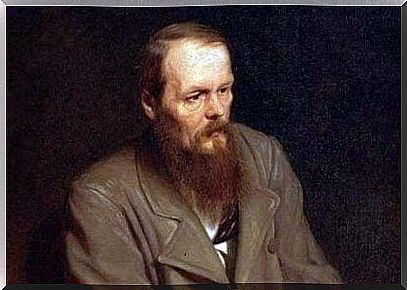The 5 Best Phrases Of Fyodor Dostoyevsky

The sentences of Fyodor Dostoyevsky are the faithful reflection of a writer with a tormented life, pronounced sensitivity and extraordinary talent. His work is one of the most beautiful that we have seen in the history of mankind.
His authoritarian father died tortured and murdered. His mother, meanwhile, died of tuberculosis when he was barely a teenager. Fyodor Dostoyevsky almost lost his mind. However, he manages to overcome this ordeal and perhaps that is why his literature is so deep and so full of beauty. Only those who have lived intensely have this ability.
It is impossible to collect all the great phrases of Fyodor Dostoyevsky. His works are very numerous. We have therefore selected a few quotes that best represent his attitude to the world and to life. Discover them now!
Franchise, a theme addressed in Dostoevsky’s sentences
One of Fyodor Dostoyevsky’s sentences states the following: “ There is nothing in the world more difficult than frankness and nothing easier than flattery”. Today it might seem obvious. However, at the time, this was a revolutionary assertion.

Dostoyevsky lived in ancient Russia, a place where classicism, authoritarianism and repression were constant. When these characteristics dominate, frankness almost turns into a misdemeanor and hypocritical flattery becomes the norm.
The two halves of life
The phrases of Fyodor Dostoyevsky speak of a man who passionately reflected on life. The most paradoxical being that death was always close to him. He had to face the death of his parents, his wife, his daughter and his brother. In fact, he himself was sentenced to death, a sentence which was later lifted.
One of his statements about life is: “ It is necessary to believe that it is true that all the second half of human life is made only of the habits contracted during the first”. During the first half of their lives, people build what they will live with for the rest of their lives.
Relativity in ethics
Ethics is one of the other recurring themes in Fyodor Dostoyevsky’s sentences. The following sentence states, for example: “ I submit to ethics but I absolutely do not understand why it is more glorious to bomb a besieged city than to murder someone with an ax”.

This is a very interesting and profound reflection. If someone kills a person, they are called an “assassin”. But if that same someone kills thousands of people, they are said to be a “hero”. How is the ethics that rejects individual evil and applauds collective damage configured? How is it possible that assassins are sometimes role models for others?
Echoes of failure
Fyodor Dostoyevsky’s life was full of vicissitudes. The two most violent blows of his life were the death of his newborn daughter and his second wife. He even lost the north and became addicted to the game. These experiences, however, were very valuable for his work.
The suffering and its effects are condensed in one of the author’s most interesting sentences. She says: “ After failure, the best-worked out plans seem absurd”. This sentence clearly reflects the emotional state that dominates after experiencing a decisive failure. It also shows how it completely alters perception by depriving things of all their meaning.
Pain teaches us
If there is one thing Fyodor Dostoyevsky knew, it was pain. However, he does not reject it as such. Rather, he thinks about it in a didactic way. He therefore points out: “ True pain, that which makes us suffer deeply, makes the thoughtless man more serious and constant. Even the poor in spirit become intelligent after great pain ”.

Somehow it makes us realize that one of the functions of pain is to educate us. Another of these functions is to give depth to our thoughts. It is not a praise of suffering but an analysis of one of its facets.
Reading the works of Fyodor Dostoyevsky is a delight. They are still perfectly in force because it did not limit itself to portraying a specific period or circumstances. On the contrary, he examined human nature in depth. These sentences constitute the testimony of a man who knew how to overcome adversities and transform them into art.










